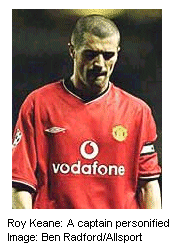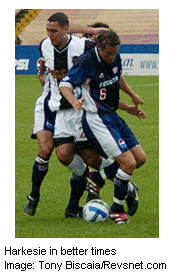From the Dugout: Issue 4
Leadership Issues
There's a reason you play follow the leader. The leader takes you anywhere he wants to go. Sometimes, these are good results. Sometimes, you just want to strangle him. It isn't so much about what you want to do; rather, you follow the leader because the group as a whole has shown faith in him. The group trusts him to lead you to the Promised Land. Everyone may not like him, but the group as a whole thinks he is most fit for the job. Or so it seems....
Something is definitely wrong with the New England Revolution. It's not all the players. Most of the players can still do their jobs with adequate success. The coach isn't the problem either. Sure, Fernando Clavijo hasn't been a perfect tactician in his year plus with the club. However, he hasn't precipitated the downfall of the club. Sunil Gulati was the major whipping boy for last year's troubles in San Jose. Gulati has managed to build a side that is capable of winning if the temperament of the squad is in place and is deployed correctly. The players are led on the field by their captain. His play dictates the play of others. When done correctly, as with Gaizka Mendieta's Valencia side, it can lead to major success. John Harkes' captaincy of the Revolution falls into the other category.
Examine the composition of this team for a second. The squad is littered with tried veterans like Leonel Alvarez, Mauricio Wright, and Juergen Sommer. Why is Harkes the one chosen to lead?

A captain must lead by example. Words will not work. You can say anything you want to the press, the fans, the coach, and opposing teammates, but a captain is judged by two things: his performance and his side's performance. Roy Keane is an outspoken player, yet he has captained his Manchester United side to the Premiership title in each of the past three years. He is allowed to do as he pleases. Right now, Harkes is not living up to those standards. He isn't expected to be Roy Keane. He's just expected to perform at a decent level for the side.
A captain's place in the side is generally automatic and near the top of the team sheet. In most cases, this makes perfect sense. In Harkes' case, it just perplexes. His play has significantly declined since his peak during his Sheffield Wednesday days in the early 90's (no, not the miserable ones spent on loan at Forest during the 1999-2000 season). Harkes was a young American lad in a foreign country. A humbling experience no doubt, and his focus on his play was undoubtedly intense. These circumstances are quite different. Harkes is now the big fish in a rather small pond. His ego has adjusted accordingly due to his vast experiences. Unfortunately, this ego inflation has had an adverse effect on his career, and is leading the Revolution into a deep, dark abyss.

Unfortunately, John Harkes' favorite player is John Harkes'. He wants to be the #10. He wants the spotlight that was so cruelly stolen from him prior to the 1998 World Cup. He can't be content with being a good captain and decent starter. John Harkes plays like he should be the center of the squad, not the complementary piece to players like Caté and Wolde Harris. Harkes just can't pass the ball to a teammate. He kicks it aimlessly down the field. His play has already rubbed off on to the defense, as Rusty Pierce and Joey Franchino are now sending the ball aimlessly down the field as well. Rather than try the solid, unspectacular pass, he goes for a longer, riskier pass. It tends to stop the offense. As a captain, he should know what is best for the team. With a sputtering offense, the smart, safe ball is the one to play.
Unselfishness is the key for a captain. The team must come first. With Harkes, it seems John Harkes comes first. When the media looks for someone to blame, John Harkes is last on John Harkes' list. He does not shoulder the load for the good of the team, unlike Joey Franchino, for example, who has readily admitted that his form this season has been bitterly disappointing. Rather, he looks towards others to share the blame. While trying to fire up his teammates is a good thing, he shouldn't be using the media to do so. This is not the role of a captain.
John Harkes is not a bad person. Rather, he is a nice man who really does fight for the Revolution cause. He certainly isn't the reason for all of the troubles. He doesn't play center back. He's not a striker. Harkes isn't even a winger, although sometimes he is erroneously deployed as one. However, with that being said, he can't be absolved of all the blame. He tries too hard to be the hub of the offense. Harkes hits foolish long balls that a player of his experience should avoid. It is possible that he could play a holding role for this side if he can learn to do what is best for the club. He is not the only problem in this side right now. The question becomes: Will he continue to be part of the problem or part of the solution?
This question was clearly answered on May 11th, 2001. John Harkes was dealt by the Revolution to Columbus for Roland Aguilera and a Conditional 2nd round draft pick in the 2002 MLS Superdraft. Clearly, there was no way back for the 34 year old Harkes under Clavijo. It says a lot about Harkes that he was shuffled off to Columbus while an older player such as Leonel Alvarez was kept. This is undoubtably the best move for all parties. Let's face it. John Harkes failed as captain of the Revolution.
